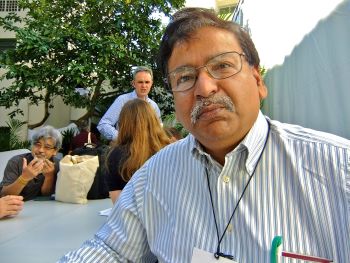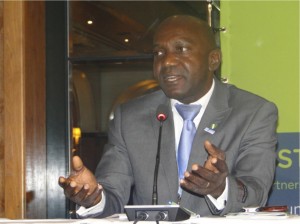As the eleventh part of the second session of the Ad Hoc Working Group on the Durban Platform for Enhanced Action (ADP) (ADP2.11) kicks off this morning in Bonn, Germany courtesy of the United Nations Framework Convention on Climate Change (UNFCCC), capacity building will be a key aspect of the deliberations. The meeting will take place from 19 – 23 October 2015.

At a pre-ADP2.11 meeting held on Saturday, Parties underlined the need for capacity building in all countries (developing as well as developed). The need for support to capacity building in developing countries was also acknowledged by Annex 1 Parties.
The difference between Annex 1 and Non-Annex 1 Parties, however, lies in how to achieve it, according to a team of participants under the global civil society platform – CAN-I.
Saleemul Huq, a Senior Fellow in the Climate Change Group at the International Institute for Environment and Development (IIED), stated: “As in so many other areas Annex 1 do not feel the need for UNFCCC to do anything more than just continue to talk about it endlessly but not do anything more. While developing countries (especially LDC Group) are pushing for a new Capacity Building Committee (or something similar) to be set up under SBI.
“The purpose of today’s workshop was to thrash out the ideas and for us to convince Annex 1 of the need for a new Committee. We did not win the argument outright but we made a strong showing.”
Describing the Paris Text on Capacity Building as “very weak”, Huq, a Bangladeshi scientist based in London, added: “CAN should support the developing countries position for a separate Capacity Building Committee.
“Incidentally one reason that many Annex 1 countries favour status quo is because they tend to provide funding for climate change capacity building through their own bilateral channels (eg DFID in UK, GIZ in Germany, etc) and their default modality is to hire a British or German consulting company who will then send an “expert” to each developing country to do a “training workshop” for a day or so and thus tick the Capacity Building box by having a few people attend their workshop.

“This is totally the wrong approach for any genuine Capacity Building initiative which needs to invest in developing Capacity Building SYSTEMs at national level.”
According to Surveyor Efik, who heads the Climate Change Network Nigeria, the capacity building workshop identified the following:
Gaps and Needs
- Institutional and systemic processes for the implementation of adaptation and mitigation
- Low capacity for MRV
- Execution/implementation of INDCs
- Coordinated plans and monitoring mechanisms to identify gaps
- Evaluation of performance
- Best practices/clear follow up and improvement of delivery
- Adequate/appropriate finance
- Focus/sustainability
- Private sector engagement/stakeholder support/gender stakeholder support
- Human capacity
He said: “In the draft decision from Warsaw, the idea is to have two representatives of each of the existing bodies, TEC and CGE) as each is doing or looking at capacity building on different themes. And it should be a dedicated team and not just a committee. Capacity to manage data, engage other stakeholders, create a framework that brings everyone on board – these are important functions that vary from country to country.
“Capacity to develop regulatory frameworks/create the enabling environment. Need for a process to better align with global and local to address the disconnect. This will also have implications for how finance is spent.”
Coherence and Coordination
- Roles and responsibility
- Parties must have some way of bringing that information to the fore – better reporting or other processes
- Need for strong analysis to enable follow-up and coordination
- Assessment of gaps can also inform the process
- Parties can put the information in better reporting (BR) if they wish to
- Countries need to be able to provide information, possibly through focal point
- Have a lot of reporting/information portal, possibly complementary at strengthening international coordination.
- Countries can help support compliance with the goals of the convention per experience of the Montreal protocol
- Regional centre can also support coordination in some cases
- Notion of funding institutional strengthening in countries
- Need to pin down what it can do beyond a reporting/gap analysis function, given the diversity of bodies in the convention.
- Need for stronger analysis to enable follow-up and coordination, take an overview/do a mapping and recommend appropriate actions (possibly tailored to the sub-groups needs.
- Timeframe: May start working January 2016
On how to strengthen the MRV system, he added: “We may need to prioritise / look at immediate term functions that need to be filled to make progress more viable. This agreement needs to set out the direction of travel on strengthening capacity building. The decision will set out practical steps to be taken, if there are unfulfilled functions that can be prioritised.
“More work needs to be done to clarify and decide the options and review the institutional arrangement for coherence of purpose.”
Further Clarification on the Initial Mode of Work at ADP 2.11
Following 22 pre-consultation meetings held by the ADP Co-Chairs, a meeting of heads of delegation was convened on 18 October 2015 to consider the initial mode of work at ADP 2.11. It was agreed that the outcome of ADP 2.11 should be a short, concise and coherent Paris package on workstreams 1 and 2 for further negotiation at COP 21. As far as possible it will include text with broad acceptance, as well as crystalized, clear options requiring final decision during the ministerial segment at COP 21.
To this end it was agreed that, following a short opening ADP plenary, an open-ended ADP contact group will be convened. Negotiating groups and interested Parties will be asked to introduce their proposed surgical insertions in textual form to the non-paper contained in document (ADP.2015.8.InformalNote). Insertions will first be invited on the draft agreement. Thereafter, insertions will be invited on the draft decision, including the draft decision on work stream 2. Such insertions should be presented orally in the room and submitted immediately to the secretariat electronically.
Parties agreed to exercise restraint in submitting proposals that in their view must be included in a revised non-paper if it is to serve as a starting point for text-based negotiation among Parties at ADP 2.11. Parties also agreed that all proposals submitted throughout the week will have the same status.
It was agreed that a meeting of heads of delegation will be convened immediately after this first session of the ADP open-ended contact group to agree on the way forward and the mode of work.
